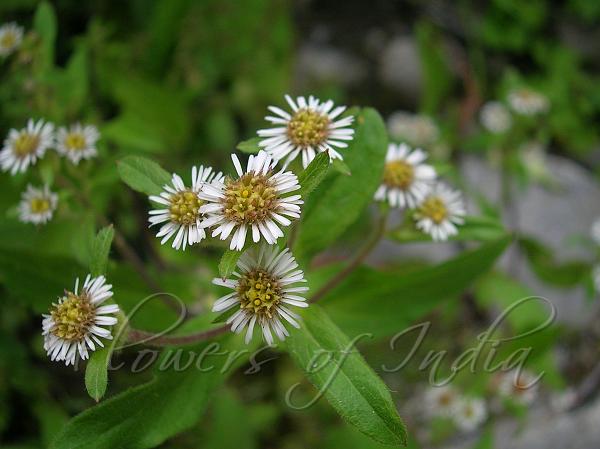|
| Himalayan Bracted-Fleabane |
|

|

| File size | 529441 |
| Original date | 8/15/06 10:03 AM |
| Resolution | 2048 x 1536 |
| Flash | Flash did not fire, auto |
| Focal length | 8.0mm |
| Exposure time | 1/356s |
| Aperture | 3.2 |
| Focus Distance | |
| Metering Mode | Partial |
| Camera make | NIKON |
| Camera model | E3700 |
| Sensor type |
|
|
|
|
Photo: |
Botanical name: Neobrachyactis anomala Family: Asteraceae (Sunflower family)
Synonyms: Brachyactis indica, Brachyactis anomalum, Erigeron anomalus, Brachyactis menthodora
Synonyms: Brachyactis indica, Brachyactis anomalum, Erigeron anomalus, Brachyactis menthodora
Himalayan Bracted-Fleabane is a perennial herb, 60-95
cm tall, with sweet menthol odor. Bracted-Fleabanes are plants with
flowers which look like
Fleabane but one or two bracts just
below the flower-heads are enlarged and look like leaves. Flower-heads
are daisy-like, solitary or 3 or 4 crowded at ends of stems or
branches, 1-1.5 cm in diameter, flower-cluster-stalks 5-10 mm.
Involucre is hemispheric-bell-shaped; bracts are membranous, outer
often 1 or 2 leaflike, green along midvein, inner linear or
linear-lanceshaped, 6-7 mm. Florets are fertile. Ray florets are
numerous, arranged in 2 series, 5-6 mm, blade bluish, longer than
style, narrow, tip 3-toothed; disk florets about 5 mm, tube and limb
base often hairy, limb funnel-shaped, lobes lanceshaped, hairless.
Stems are erect, rigid, tinged pinkish violet, shortly branched,
glandular. Leaves are crowded, surfaces densely stipitate glandular,
basal and lower stem leaves long stalked, obovate or
oblong-lanceshaped, 1.5-5 x 0.5-1.5 cm, margin sawtoothed, tip pointed
or arcuate; upper stalkless, gradually reduced, base somewhat
stem-clasping, decurrent, rounded. Achenes are brown,
inverted-lanceshaped, compressed, 3-3.5 mm, sparsely bristly. Himalayan
Bracted-Fleabane is found in alpine thicket margins, grasslands on
slopes, at altitudes of 3300-4000 m, in the Himalayas, from Kashmir to
Sikkim, S. Tibet. Flowering: May-September.
| Identification credit: Tabish | Photographed in Valley of Flowers, Uttarakhand. |
• Is this flower misidentified? If yes,